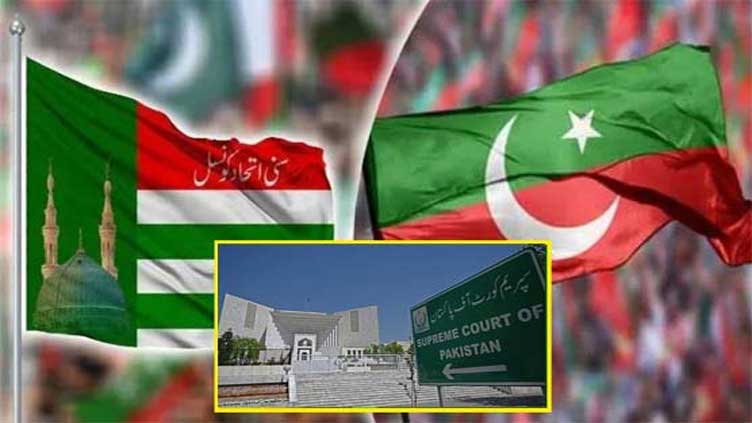Supreme Court suspends PHC, ECP rulings on reserved seats

Pakistan
Admits SIC's appeal for reserved seats
ISLAMABAD (Dunya News) - The Supreme Court on Monday, while admitting the Sunni Ittehad Council's appeal for hearing, suspended the Peshawar High Court (PHC) and the Election Commission of Pakistan's (ECP) decision to give SIC's reserved seats to other parties.
As the proceedings resumed, Justice Mansoor Ali Shah remarked that mandate given by the people should be properly represented in parliament.
Counsel for the ECP said, “Let me tell you what the Election Commission has actually done. The reserved seats were distributed only once. These were not re-distributed.”
Justice Shah remarked that court was not concerned with what the Election Commission had done, but what the Constitution says. “Isn't it against the principle of proportionality to give more seats to other parties?,” asked Justice Shah.
Justice Athar Minallah observed that seats were given to other parties out of proportion. He observed that a party could contest elections as a political party even after losing the electoral symbol.
The Supreme Court then sent the matter of reserved seats to Judges Committee to decide whether the case would be heard by the same bench or a larger bench would be constituted to hear it.
On March 4 last, the Election Commission of Pakistan had accepted applications of the opposing parties and decided that the seats in the National Assembly and provincial assemblies would not remain vacant and would be allocated by a proportional representation process on the basis of seats won by political parties.
The development resulted in PTI-backed SIC losing a total of 77 reserved seats - 23 National Assembly seats (20 women and 3 minorities), 25 Khyber Pakhtunkhwa Assembly seats (21 women and 4 minorities), two Sindh Assembly seats (women) and 27 Punjab Assembly seats (24 women and 3 minority).
The Peshawar High Court had also rejected petitions filed by the Sunni Ittehad Council (SIC) for the reserved seats of women and minorities.The party had challenged the Election Commission of Pakistan’s (ECP) verdict of not allocating the reserved women and minority seats to the SIC.
Earlier proceedings
During earlier hearing, the apex court had rejected the federal government's objection to the three-member bench in a case of not awarding reserved seats to the Sunni Ittehad Council (SIC).
A three-member bench, headed by Justice Mansoor Ali Shah and comprising Justice Muhammad Ali Mazhar and Justice Athar Minallah, heard the appeal filed by the Sunni Ittehad Council for reserved seats.
The federal government requested the court to constitute a larger bench to hear the case. On behalf of the federal government, Additional Attorney General Aamir Rahman said only a larger bench could hear the appeals. However, the court rejected the objection.
The women lawmakers, elected on reserved seats, also raised objection to the bench. The lawyer representing the women lawmakers said it was a case of interpretation of Article 51 of the Constitution, and only a five-member bench could hear the case under the Practice and Procedures Act.
Justice Mansoor Ali Shah remarked that the present case was being heard as an appeal under Article 185 of the Constitution. The present case was not filed under Article 184/3. He said the court had to decide whether the appeals were admissible or not.
He remarked that if a decision was taken that the case was maintainable, a larger bench could also be constituted to hear the case.
Arguments of SIC lawyer
Advocate Faisal Siddiqui, the lawyer of the Sunni Ittehad Council, started advancing the arguments. Siddiqui said after the Feb 8 general elections, PTI's returned candidates joined the Sunni Ittehad Council.
Justice Mansoor Ali Shah remarked that seven candidates were still part of the National Assembly with independent status.
Justice Athar Minallah asked whether the PTI was a registered political party.
Advocate Siddiqui said the PTI was a registered political party. Justice Shah remarked that it was a registered political party but did not participate in the election.
Justice Muhammad Ali Mazhar inquired that independent members had to join a party in how many days? Siddiqui said independent members of the National Assembly had to join a political party within three days.
Justice Minallah inquired, “If a political party does not have an election symbol, will its candidates lose the right to represent?” Siddiqui told the court that a political party could become a parliamentary party by participating in elections.
Another situation is that a political party does not participate in elections and the winning members join that party.
Justice Shah asked under what formula the distribution of reserved seats among political parties is made?
“Will the political party take reserved seats according to the number of seats won or can it take more? Justice Shah inquired. Siddiqui said no political party could take reserved seats more than its proportion.


